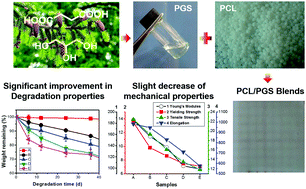当前位置:
X-MOL 学术
›
Mater. Chem. Front.
›
论文详情
Our official English website, www.x-mol.net, welcomes your
feedback! (Note: you will need to create a separate account there.)
A green pathway to adjust the mechanical properties and degradation rate of PCL by blending bio-sourced poly(glycerol-succinate) oligoesters†
Materials Chemistry Frontiers ( IF 6.0 ) Pub Date : 2018-01-09 00:00:00 , DOI: 10.1039/c7qm00600d Guang-Zhong Yin 1, 2, 2, 3, 4 , Xiao-Mei Yang 2, 3, 5 , Zheng Zhou 2, 4, 6 , Qi-Fang Li 2, 4, 6
Materials Chemistry Frontiers ( IF 6.0 ) Pub Date : 2018-01-09 00:00:00 , DOI: 10.1039/c7qm00600d Guang-Zhong Yin 1, 2, 2, 3, 4 , Xiao-Mei Yang 2, 3, 5 , Zheng Zhou 2, 4, 6 , Qi-Fang Li 2, 4, 6
Affiliation

|
Fully bio-sourced oligoesters based on poly(glycerol-succinate) (PGS) with controllable sizes and topologies were prepared by melt phase polycondensation. The oligoesters were further used to modify poly(ε-caprolactone) (PCL) by the blending method under mild processing conditions. As can be observed, the PGS modifier was well dispersed in the PCL matrix. The PGS could influence the crystallization and significantly accelerate the degradation of the PCL matrix. There was no significant decrease of mechanical properties after blending modification. Notably, the method used here is quite convenient and solvent-free, by which we can achieve PCL modification under very mild conditions. Therefore, the work proposed here is an effective, sustainable and environmentally friendly modifying method for PCL to accelerate the degradation rate.
中文翻译:

通过混合生物来源的聚(琥珀酸甘油酯)低聚酯来调节PCL的机械性能和降解速率的绿色途径†
通过熔融相缩聚制备了具有可控制的尺寸和拓扑结构的完全生物来源的基于聚(琥珀酸甘油酯)(PGS)的低聚酯。在温和的加工条件下,通过共混方法将低聚酯进一步用于改性聚(ε-己内酯)(PCL)。可以看出,PGS改性剂很好地分散在PCL基质中。PGS可能影响结晶并显着加速PCL基质的降解。共混改性后机械性能没有明显降低。值得注意的是,此处使用的方法非常方便且无溶剂,通过这种方法,我们可以在非常温和的条件下实现PCL改性。因此,本文提出的工作是PCL加速降解速率的一种有效,可持续和环保的改性方法。
更新日期:2018-01-09
中文翻译:

通过混合生物来源的聚(琥珀酸甘油酯)低聚酯来调节PCL的机械性能和降解速率的绿色途径†
通过熔融相缩聚制备了具有可控制的尺寸和拓扑结构的完全生物来源的基于聚(琥珀酸甘油酯)(PGS)的低聚酯。在温和的加工条件下,通过共混方法将低聚酯进一步用于改性聚(ε-己内酯)(PCL)。可以看出,PGS改性剂很好地分散在PCL基质中。PGS可能影响结晶并显着加速PCL基质的降解。共混改性后机械性能没有明显降低。值得注意的是,此处使用的方法非常方便且无溶剂,通过这种方法,我们可以在非常温和的条件下实现PCL改性。因此,本文提出的工作是PCL加速降解速率的一种有效,可持续和环保的改性方法。











































 京公网安备 11010802027423号
京公网安备 11010802027423号